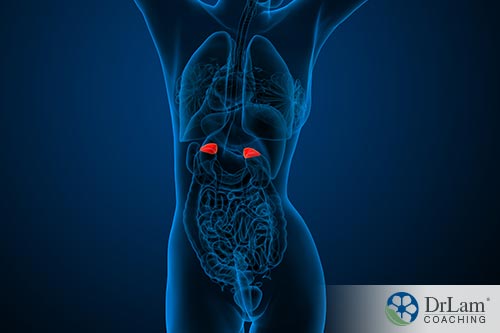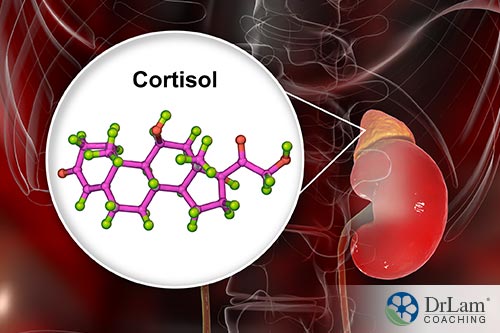 Your body has a complex mechanism that helps it respond and adapt to stress. It’s called the NeuroEndoMetabolic (NEM) Stress Response and it’s composed of six circuits of organs and systems that work together. To answer the question “what is cortisol?” in a way that makes sense to your overall health, we need to look at its role within this mechanism.
Your body has a complex mechanism that helps it respond and adapt to stress. It’s called the NeuroEndoMetabolic (NEM) Stress Response and it’s composed of six circuits of organs and systems that work together. To answer the question “what is cortisol?” in a way that makes sense to your overall health, we need to look at its role within this mechanism.
The six NEM circuits are the Hormone, the Bioenergetics, the Cardionomic, the Neuroaffect, the Inflammation, and the Detoxification circuits. Your adrenal glands are what secrete cortisol, and they are a main component of your NEM’s Hormone circuit. But because the circuits are connected, cortisol affects all the other components as well.
Your Hormone circuit is made up of the adrenal glands, the thyroid, and the reproductive organs that produce hormones. That would be the ovaries in women and the testes in men. The control center in the brain, the hypothalamus and pituitary gland, is what modulates all of these components. They work together through what we call a hormone cascade.
The hypothalamic-pituitary-adrenal (HPA) axis is the hormone cascade associated with the adrenal glands. And the reason it’s called a hormone cascade is because, at each point of this axis, a hormone is released in order to activate the next point. The hypothalamus releases corticotropin-releasing hormone (CRH) which signals to the pituitary gland to release adrenocorticotropic hormone (ACTH). ACTH then stimulates the adrenals cortex, which then secretes cortisol.
So that’s the first answer to “what is cortisol?” – it’s a stress hormone released by the adrenal glands under the instruction of the HPA axis. And the HPA gets activated in response to the presence of stress, as part of the more global NEM response to stress.
But how does this HPA get turned off? How does your body control how much cortisol it secretes?
Through the HPA's negative feedback mechanism.
Excess cortisol that was not used up by the stress response then acts as an inhibitor to the hypothalamus and pituitary gland. It stops the hormone cascade so that the adrenals are not stimulated into secreting more of it. This is important because, as we’ll see, too much or too little cortisol can have detrimental effects on your health.
Understanding the many roles of cortisol highlights how important it is to keep it in a healthy range or bring it back into balance. Cortisol:
 helps manage your metabolism
helps manage your metabolismAs you can see, those are important functions, and so it’s crucial for your health that cortisol levels remain in the healthy range. Although cortisol naturally rises and falls during a 24-hour cycle, it should stay above and below a certain level. If it crosses these levels, especially for prolonged periods of time, you can begin to get symptoms and develop certain health conditions.
When your body is facing a lot of stress, your NEM begins to go into overdrive. This includes your Hormone Circuit, and in turn, your adrenal glands. Your adrenals have to keep producing more and more cortisol to meet the growing demand. And if stress is chronic, this trend keeps going and you get a constant cortisol surplus in your system.
This marks the beginning stages of Adrenal Fatigue Syndrome (AFS), a condition with the following symptoms:
The reason there is such a variety of symptoms with adrenal fatigue is because of how cortisol affects so many other hormone systems as well as the rest of the NEM. In the beginning stages of AFS, these symptoms are milder, and can sometimes improve with a bit of rest. Stimulants and exercise can also relieve the symptoms.
But unless you address AFS at its root, these improvements will be temporary. It is critical to address the stressors that caused this issue in the first place, along with taking some fundamental recovery steps. Unfortunately, not many people know about AFS, and so the symptoms are brushed off and the AFS worsens, leading to the more advanced stages.
 In the more advanced stages of AFS, the adrenal glands have become so exhausted that their cortisol output drops. And since your body still needs cortisol, not only to fight off the stress, but also to modulate the functions mentioned earlier, there is now a cortisol deficiency. There’s not enough cortisol for your body to function properly.
In the more advanced stages of AFS, the adrenal glands have become so exhausted that their cortisol output drops. And since your body still needs cortisol, not only to fight off the stress, but also to modulate the functions mentioned earlier, there is now a cortisol deficiency. There’s not enough cortisol for your body to function properly.
You may have the same symptoms as above, but more intensified. And you may develop new symptoms as well.
There’s also a similar condition that creates cortisol deficiency, Addison’s disease, and it’s often confused with AFS. But addressing it is quite different, and it can be life-threatening if not treated in a timely way. Both conditions can be quite serious, so if you suspect having either of them, it’s important to get the right kind of professional support as soon as possible.
If you have questions about what is cortisol, how it affects health, or adrenal fatigue recovery, you can contact the Dr. Lam Coaching team. We can offer you a free** no-obligation phone consultation at +1 (626) 571-1234 where we will privately discuss your symptoms and what your options are. You can also send us a question through our Ask The Doctor system by clicking here.
What is cortisol? It’s a steroid hormone that helps your body respond and adapt to stress. And the way it does this is just as important to understand if you want to address any of its related conditions. Including its surplus and deficiency. This is our brief overview of cortisol.
